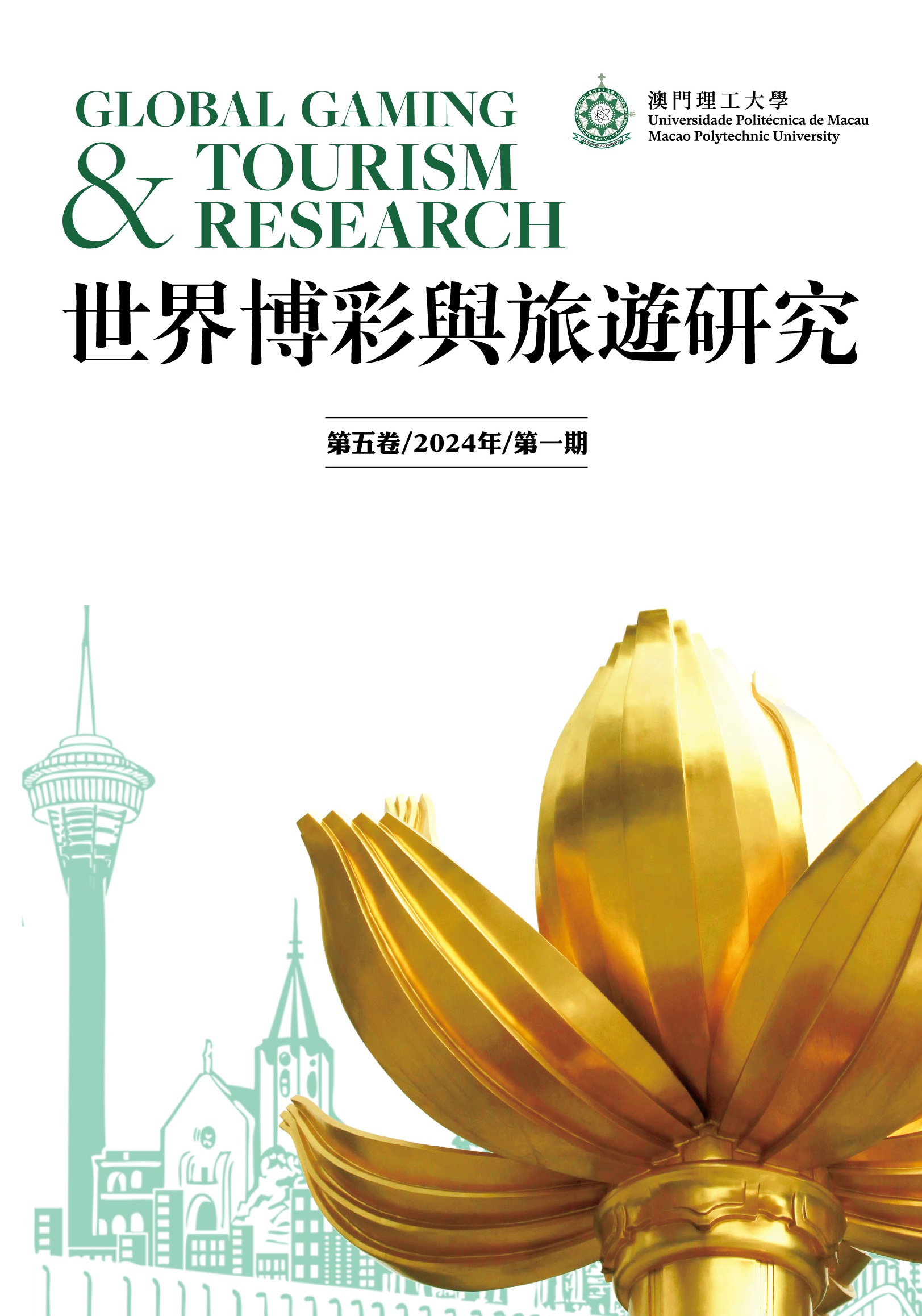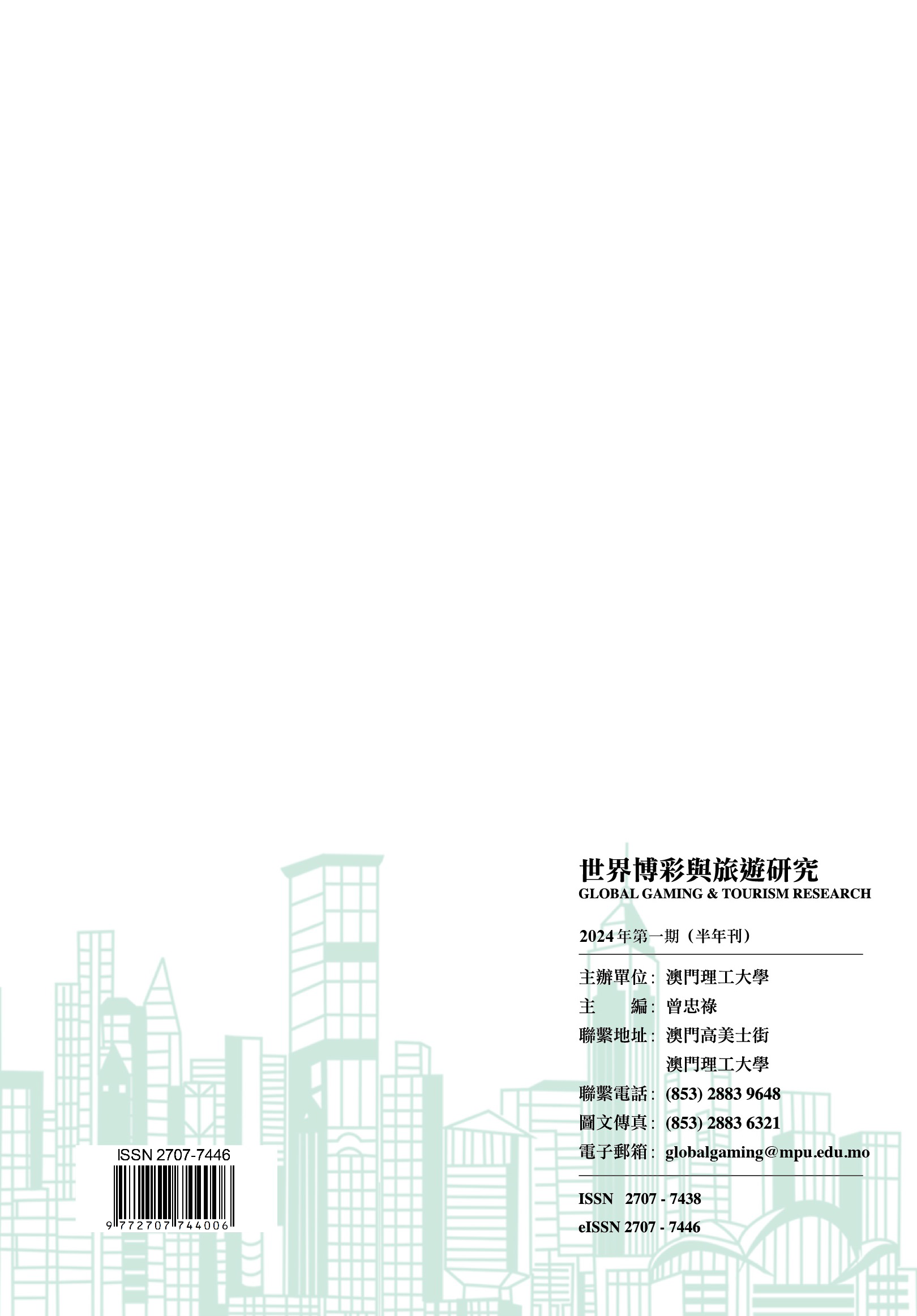Estudos na Área do Jogo e do Turismo Mundial


|
ISSN: |
ISSN 2707-7438 eISSN 2707-7446 |
|---|---|
|
Period: |
Semi-annually |
|
Introduction: |
“Global Gaming & Tourism Research” aims to promote the sustainable development of the gaming and tourism industry. In addition to providing support for science-based decision-making across the public and gaming sectors, this academic journal seeks to serve as an exchange platform for gaming and tourism research work. “Global Gaming & Tourism Research” covers such key areas as the development trend of the Macao and global gaming industries, evolution and trend of consumer preference among gaming tourists, responsible gaming theory and practice, tourist behaviour theory and case studies, and tourist destination management theory and practice, etc. Contributions by experts, scholars and industry practitioners are welcome. |
|
|
|
The New Normal of Macao’s Gaming Industry After the Covid-19 Pandemic and the Responses to It
Abstract:The COVID-19 pandemic dealt a severe blow to the gambling industry in Macao. After gaining control over the outbreak, the Macao gaming sector rebounded swiftly, although it has not yet reached pre-pandemic levels. With tourism gradually returning to normal and Macao’s unique advantages, such as its proximity to mainland China and the clustering effect of the gaming industry, Macau’s gaming sector is expected to maintain a stable recovery. However, given the structural changes in the industry, future gambling revenue will increasingly rely on the mass market segment. Macau’s gaming operators must adapt to this new normal and implement appropriate response measures. Key words: Macao gaming; COVID-19; Las Vegas casinos; Southeast Asian casinos; VIP rooms
|
Wang Changbin |
|
Macau Gaming Companies’ Performance in Social Responsibility(2012-2021):Measurement and Analysis
Abstract: This study evaluates the social responsibility performance of six gaming companies in Macau from 2012 to 2021 from the perspective of stakeholder theory. The contributions of the six gaming companies as a whole and individually to the Macau’s government finance and community’s employment were analyzed. The study also analyzed the SAR government’s expectations for gaming [JP3]companies over the past 10 years, as well as the six gaming companies’ responses to the government’s[JP] expectations as a whole and individually. The result shows that the six gaming companies have made huge contributions to government finances and community’s employment, but they lack initiative in responding to the expectations of their major stakeholders. But different companies have different results, six gaming companies had deficiencies in information disclosure. This study provides a reference for evaluating the social responsibility of Macau gaming companies. Key words:Macao; gaming companies; social responsibility; evaluation; stakeholder theory
|
Zeng Zhonglu, |
|
Casino Employees’ IntentionsToward Adopting Innovative Technologies: An Empirical Study of Slot Player Tracking Systems
Abstract:Facing challenges brought by Industry 4.0, casino gaming operators must understand how to promote employee adoption and active use of innovative technologies if they are to successfully transform their service- oriented business models digitally. However, there is still a lack of empirical research in this area. Therefore, this study aims to examine the key factors and interrelationships that influence casino employees’ intentions toward using innovative technologies by combining employees’ perceptions of system quality with the Unified Theory of Acceptance and Use of Technology (UTAUT), using slot player tracking systems as an example. This study collected sample data from the casino gaming operators in Macao and analyzed the data using partial least squares structural equation modeling. The results indicate that performance expectancy, effort expectancy, social influence, and system quality have significant positive impacts on intentions to use, with social influence having the greatest impact. The analysis also reveals that employees consider flexibility, response time, and compatibility as important attributes of system quality. The research findings validate the applicability of UTAUT in the field of casino research. The conclusions provide meaningful optimization recommendations for casino management and system developers. Key words:Macao; gaming industry employees; digital transformation; casino; slot machine; player tracking system; technology acceptance theory
|
Chau Keng Fong, |
|
|
|
Research on the Spatial Distribution and Influencing Factors of Rural Homestays in Beijing Based on POI Data Mining
Abstract:This study obtained data on homestays in Pinggu District, Beijing, through POI mining, official statistical data, and field research. Using methods such as average nearest neighbor index, standard deviation ellipse, kernel density analysis, and buffer zone, the spatial distribution characteristics of homestays in Pinggu District were analyzed with the help of ArcGIS software, and the influencing factors were analyzed. The research results indicate that the homestays in Pinggu District exhibit a highly concentrated spatial pattern, with a northwest southeast extension direction and a belt like agglomeration in the directions of Jinhai Lake, Huangsongyu, Nandule River, and Shandong Zhuang. The diffusion effect is not significant. Scenic areas, transportation arteries, regional brands, and residential areas all have an impact on the agglomeration of rural homestays. This article provides suggestions for the future development of rural homestays in Pinggu District. Key words:Beijing; rural homestays; data mining; spatial distribution; agglomeration characteristics; influencing factors
|
Yin Ping, |
|
Cultural Governance: Exploring the Connotation and Significance of “Festivalization” Development Model in Macao
Abstract:Cultural governance is an important direction in the field of contemporary urban governance, and one of its important goals is to promote equal dialogue of multiculturalism, and maintain the stable development of multicultural society. In recent years, a cultural governance model centered on “festivalization” has emerged in Macao, an international city with diverse cultures coexisting. The key point of this model is to fully activate and showcase the different meanings and connotations of different types of festival activities in the multicultural space of Macao and promote interaction among diverse subjects. The operational effect of this model is to facilitate the positive interaction between individual needs expression and collective emotional carnival in various festival activities, as well as jointly shaping the collective memory and tourism destination image of multicultural space in Macao. The achievement of the “festivalization” governance model in Macao has strong enlightening value for many urban tourism destinations seeking a balanced development path amidst the complex entanglement between tradition and modernity, global and local, government and market. At the same time, it also refines the application of cultural governance theory in the research field of festival tourism and urban development. Key words:cultural governance; festival activities; place identity; multiculturalism; Macao
|
Pei Qirong, |
|
Research on Urban Tourism Experience Based on Grounded Theory: A Case Study on Chinese Mainland Tourists Visiting Macao
Abstract:Recreation is one of the fundamental functions of a city, and improving the urban tourism experience of tourists can optimize the construction of urban tourism destinations. Based on the travel notes of Chinese mainland tourists visiting Macao, this paper uses grounded theory to code step by step to construct an urban tourism experience model, and uses the IPA analysis method to quantitatively analyze the quality of experience elements during travel. Research has shown that, urban tourism experience runs through the entire process of tourism activities, including the generation of willingness and decisionmaking preparation in the pretour stage, the urban natural elements, urban infrastructure, landscape conditions, tourism consumption experience, leisure and entertainment activities, atmosphere perception during travel, and final evaluation in the posttour stage; Among the 23 experience elements during travel, the importance and satisfaction of “food experience” are both high, while the satisfaction of “tourism crowding perception” is the lowest, there is no element of high importance but low satisfaction, indicating that urban tourism in Macao effectively meets the core tourism needs of Chinese mainland tourists. Key words: Macao; urban tourism; tourism experience; grounded theory; IPA analysis method
|
Xie Hongjing, |
|
Exploring Tourists Service Experience and Behavior Intention in Factory tourism Using SOR Model
Abstract:As one of the most important forms of industrial tourism, factory tourism is an important means for consumers to observe the production facilities and processes directly and to build brand trust and customer loyalty. Existing studies lack research on factory tourism service approach, tourists’ experience and behavioral intention. Based on the Stimulus-Organism-Response (SOR) model, this study examines the effects of factory tourism stimulus elements (environment, people, and performance) on tourists’ experience (including aesthetics, entertainment, education, and escape) as well as behavioral intentions from a service theater perspective. The questionnaire survey was conducted using convenience sampling and 447 valid samples were obtained. Data analysis showed that the stimulus elements of factory tourism have a positive effect on tourists’ experience, in which two elements, environment and performance, have a direct effect on the experience dimensions (aesthetics and entertainment, education and escape), but the personnel element only has a direct effect on educational experience, and all the elements of the experience have a direct effect on tourists’ behavioral intention. The study shows that applying service theater theory to enhance the service stimulation elements of industrial tourism site will significantly improve the visitor experience, and then enhance the positive behavioral intention of visitors. Key words:industrial tourism; factory tourism; tourism experience; behavioural intention; Stimulus Organism- Response ( SOR) model; service theater
|
Zhang Tao, |
|
Perceived Experiences of Intangible Cultural Heritage Hotels from a Sense of Place Perspective:A Case Study of YUY Hotel in Chaozhou
Abstract:As the spiritual wealth of human civilization, the protection and inheritance of intangible cultural heritage has become the focus of many disciplines. Taking the YUY Hotel in Chaozhou as an example, this paper explores the place identity and sense of attachment conveyed through the prism of intangible cultural heritage from the perspective of sense of place. Using web text analysis, the study collects and organizes textual data from tourists who have stayed at the YUY Hotel, aiming to investigate the local identification and attachment fostered by the hotel through the presentation of intangible cultural heritage. It is found that, from the spiritual level, the interaction and connection of time and space between people, hotel, intangible cultural heritage and the situation, as well as the emotional flow, work together and affect the dynamic process of intangible cultural heritage inheritance. From the practical level, the integration of intangible cultural heritage and commerce has injected more favorable economic support for intangible cultural heritage. Sustainable inheritance of intangible cultural heritage requires continuous human - place interaction and the construction of local identity within the practice of heritage hotels. Key words:local identity; sense of place; intangible cultural heritage; YUY Hotel; web text analysis
|
Zhang Han, |
|
The Effect of Restaurant Atmospheric Stimuli on Customer Intimacy and Behavioral Intentions:Western Cultural Familiarity as Moderator
Abstract: In recent years, atmosphere has gradually become significant tangible cues influencing customer evaluations in various service environments. However, existing research has seldom focused on the impact of decoration style factors in restaurant atmosphere stimulation on customers. Therefore, this study, based on the Cognition-Affect-Behavior (CAB) framework and the “Coalescence Effect” theory, explores the influence of Chinese restaurant atmospheric stimuli on the customer intimacy and behavioral intentions of bicultural customers. A 2 (restaurant atmospheric stimuli: local vs. foreign appeal) × 2 (Western cultural familiarity: low vs. high) experimental design was employed, with 430 university students from Macao, China as the experimental subjects. The results indicated that restaurant atmospheric stimuli can significantly enhance customer intimacy and behavioral intentions, and that customer intimacy also has a significant positive effect on behavioral intentions. Furthermore, Western cultural familiarity not only moderates the relationship between restaurant atmospheric stimuli and behavioral intentions but also plays a moderating role in the "restaurant atmospheric stimuli - customer intimacy - behavioral intentions" mediation chain. This study not only enriches the theoretical research on restaurant atmospheric stimuli and customer behavioral intentions but also provides practical guidance for restaurant enterprises to create customer experiences as well as to enhance customer satisfaction and loyalty in a cross- cultural context. Key words:restaurant atmospheric stimuli; coalescence effect; customer intimacy; cultural familiarity; behavioral intention; Cognition-Affect-Behavior (CAB) framework
|
Wang Ziqi, |
|
|
|
|
|
|
|
|



